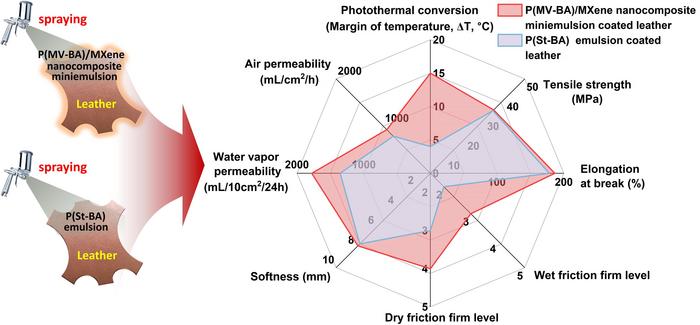A study published in the journal of Engineering reveals a remarkable development in the field of green coating materials for leather. Researchers have successfully synthesized a solvent-free, bio-based antibacterial agent and aromatic monomer called methacrylated vanillin (MV). This innovative compound not only imparts antibacterial properties to leather coatings but also serves as an eco-friendly alternative to the petroleum-based carcinogen styrene (St).

Credit: Jianzhong Ma, Li Ma, Lei Zhang, Wenbo Zhang, Qianqian Fan, Buxing Han
A study published in the journal of Engineering reveals a remarkable development in the field of green coating materials for leather. Researchers have successfully synthesized a solvent-free, bio-based antibacterial agent and aromatic monomer called methacrylated vanillin (MV). This innovative compound not only imparts antibacterial properties to leather coatings but also serves as an eco-friendly alternative to the petroleum-based carcinogen styrene (St).
In this research article, titled “Bio-based Waterborne Poly(Vanillin-Butyl Acrylate)/MXene Coatings for Leather with Desired Warmth Retention and Antibacterial Properties,” the team of scientists describes the synthesis of waterborne bio-based P(MV–BA) miniemulsion through copolymerization of MV with butyl acrylate (BA). The miniemulsion polymerization method enables the production of a green coating material that is free from harmful solvents.
To enhance the performance of the P(MV–BA) miniemulsion, the researchers introduced MXene nanosheets into the formulation. MXene, known for its exceptional photothermal conversion capabilities and antibacterial properties, was dispersed in the P(MV–BA) miniemulsion using ultrasonic techniques. The migration of MXene nanosheets to the surface of the leather coatings during the solidification process, facilitated by ultrasonication and the amphiphilicity of MXene, maximizes its exposure to light and bacteria. This results in significant antibacterial efficacy and a remarkable increase in surface temperature.
The study demonstrated that when the dosage of MXene nanosheets was 1.4 wt%, the surface temperature of the leather coated with P(MV–BA)/MXene nanocomposite miniemulsion increased by approximately 15 °C in outdoor winter conditions. Additionally, under simulated sunlight treatment for 30 minutes, the antibacterial rate against Escherichia coli and Staphylococcus aureus reached nearly 100%. Furthermore, the introduction of MXene nanosheets improved the air permeability, water vapor permeability, and thermal stability of the coatings.
This research not only provides a novel and sustainable approach to developing bio-based nanocomposite coatings for leather but also offers the potential for zero-carbon heating based on sunlight during winter. By reducing the reliance on fossil fuels and minimizing greenhouse gas emissions, this technology aligns with the global goal of combating climate change. Moreover, the enhanced antibacterial properties of the coatings enable better protection against harmful bacteria, viruses, and other microorganisms.
The team’s findings open up new avenues for the production of environmentally friendly coating materials, not only for leather but also for paper, architectural coatings, and various other industries. The bio-based P(MV–BA)/MXene nanocomposite coating material exhibits superior wearing comfort and hygiene performance, making it an ideal green alternative to petroleum-based coating materials such as P(St–BA).
This study represents a significant contribution to the green and sustainable development of coating materials, revolutionizing the way we approach the production of leather and other coated products. The researchers’ commitment to innovation and their dedication to creating a more environmentally conscious future exemplify the transformative power of scientific research.
The paper “Bio-based Waterborne Poly(Vanillin-Butyl Acrylate)/MXene Coatings for Leather with Desired Warmth Retention and Antibacterial Properties” has been published in Engineering, authored by Jianzhong Ma, Li Ma, Lei Zhang, Wenbo Zhang, Qianqian Fan, Buxing Han. Full text of the open access paper: https://doi.org/10.1016/j.eng.2023.06.005. For more information about the Engineering, follow us on Twitter (https://twitter.com/EngineeringJrnl) & Like us on Facebook (https://www.facebook.com/EngineeringPortfolio).
Journal
Engineering
DOI
10.1016/j.eng.2023.06.005
Article Title
Bio-based Waterborne Poly(Vanillin-Butyl Acrylate)/MXene Coatings for Leather with Desired Warmth Retention and Antibacterial Properties
Article Publication Date
30-Jun-2023




